第九章 国际货物运输中的保函及无单放货
- 格式:ppt
- 大小:158.00 KB
- 文档页数:13
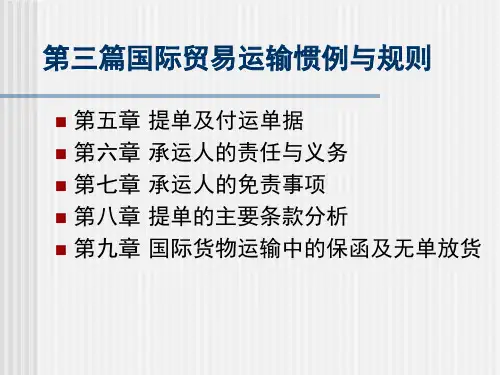
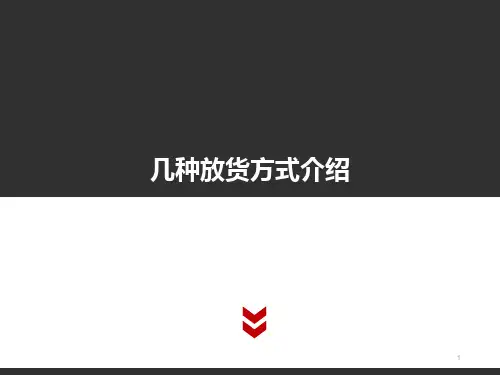

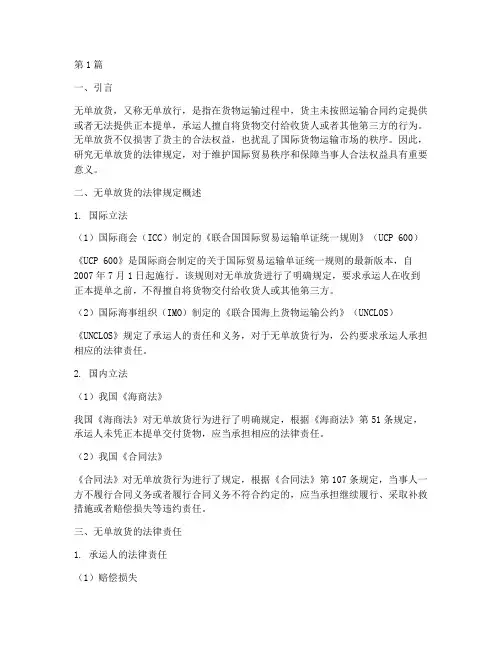
第1篇一、引言无单放货,又称无单放行,是指在货物运输过程中,货主未按照运输合同约定提供或者无法提供正本提单,承运人擅自将货物交付给收货人或者其他第三方的行为。
无单放货不仅损害了货主的合法权益,也扰乱了国际货物运输市场的秩序。
因此,研究无单放货的法律规定,对于维护国际贸易秩序和保障当事人合法权益具有重要意义。
二、无单放货的法律规定概述1. 国际立法(1)国际商会(ICC)制定的《联合国国际贸易运输单证统一规则》(UCP 600)《UCP 600》是国际商会制定的关于国际贸易运输单证统一规则的最新版本,自2007年7月1日起施行。
该规则对无单放货进行了明确规定,要求承运人在收到正本提单之前,不得擅自将货物交付给收货人或其他第三方。
(2)国际海事组织(IMO)制定的《联合国海上货物运输公约》(UNCLOS)《UNCLOS》规定了承运人的责任和义务,对于无单放货行为,公约要求承运人承担相应的法律责任。
2. 国内立法(1)我国《海商法》我国《海商法》对无单放货行为进行了明确规定,根据《海商法》第51条规定,承运人未凭正本提单交付货物,应当承担相应的法律责任。
(2)我国《合同法》《合同法》对无单放货行为进行了规定,根据《合同法》第107条规定,当事人一方不履行合同义务或者履行合同义务不符合约定的,应当承担继续履行、采取补救措施或者赔偿损失等违约责任。
三、无单放货的法律责任1. 承运人的法律责任(1)赔偿损失承运人未凭正本提单交付货物,给货主造成损失的,应当承担赔偿责任。
赔偿金额应当包括货物的实际损失、运费、保险费等。
(2)承担违约责任承运人未履行合同义务,应当承担违约责任,包括支付违约金、继续履行合同等。
2. 收货人的法律责任(1)返还货物收货人非法取得货物,应当返还货物给货主。
(2)赔偿损失收货人非法取得货物,给货主造成损失的,应当承担赔偿责任。
四、无单放货的预防措施1. 货主防范措施(1)确保提单真实有效货主在签订货物运输合同时,应确保提单真实有效,避免因提单问题导致无单放货。
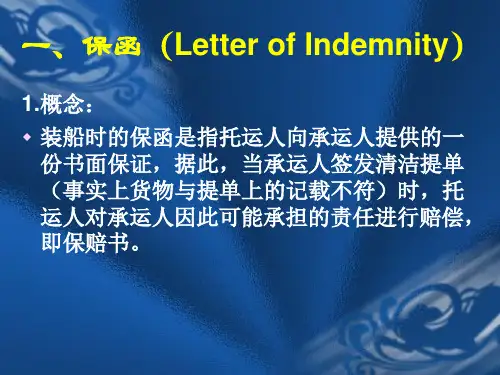
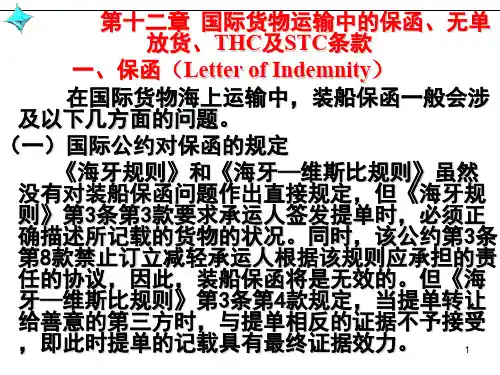

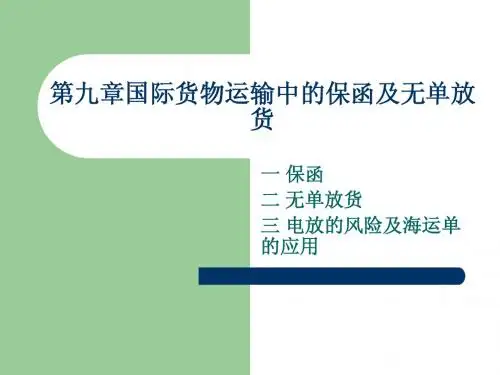
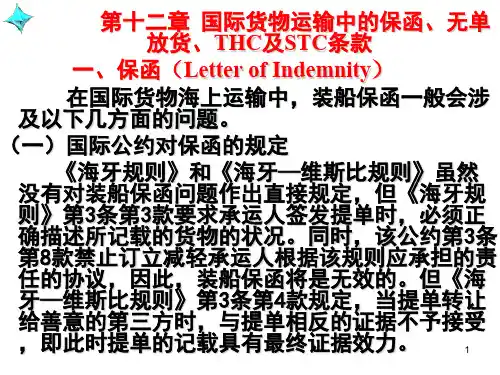
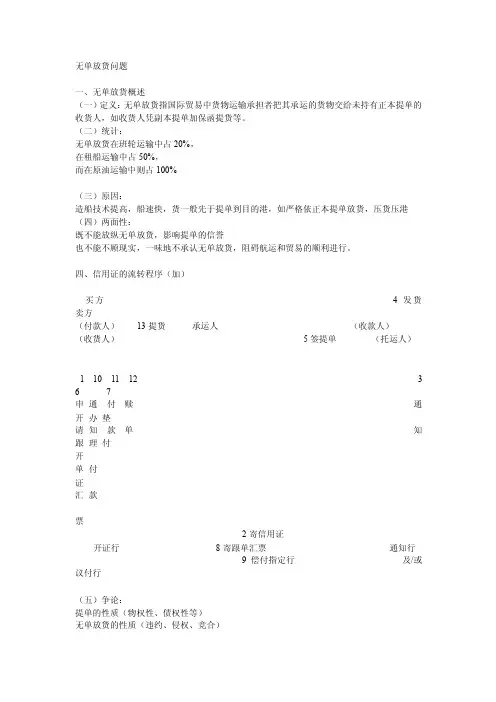
无单放货问题一、无单放货概述(一)定义:无单放货指国际贸易中货物运输承担者把其承运的货物交给未持有正本提单的收货人,如收货人凭副本提单加保函提货等。
(二)统计:无单放货在班轮运输中占20%,在租船运输中占50%,而在原油运输中则占100%(三)原因:造船技术提高,船速快,货一般先于提单到目的港,如严格依正本提单放货,压货压港(四)两面性:既不能放纵无单放货,影响提单的信誉也不能不顾现实,一味地不承认无单放货,阻碍航运和贸易的顺利进行。
四、信用证的流转程序(加)买方4发货卖方(付款人)13提货承运人(收款人)(收货人)5签提单(托运人)1 10 11 123 6 7申通付赎通开办垫请知款单知跟理付开单付证汇款票2寄信用证开证行8寄跟单汇票通知行9偿付指定行及/或议付行(五)争论:提单的性质(物权性、债权性等)无单放货的性质(违约、侵权、竞合)记名提单无单放货问题(可、不可)构成要件(主观、客观、因果关系)法律适用(海商法、民法)赔偿范围(CIF价)责任限制与免除(不能限制责任)举证责任(货方、船方)诉讼时效等均有争论(1年,2年)二、有关无单放货的案例(一)实例:“银标”轮无单放货案中国冶金进出口陕西公司(下称陕西公司)于1994年从俄罗斯进口了一批钢材9022.445公吨,CIF中国防城港,每公吨280美元,装货港为圣彼得堡。
信用证方式付款。
1994年4月22日,开证行西安工商行国际部(西安工商)收到信用证项下的全套正本提单、商业发票等单证,西安工商行国际部通知陕西公司付款,同月25日,陕西公司同意付款。
1994年7月至1995年3月,陕西公司分期支付了部分货款。
1995年3月10日,陕西公司通知西安工商行,称因其客户尚未付清所拖欠余款,陕西公司无款赎单,提单项下全部货物归银行所有,此后陕西公司不再付款。
与陕西公司签订了买卖合同的最后买方北海金鼎兴业有限公司(下称金鼎公司)于1994年4月“银标”轮抵达湛江港卸货时向该轮船代(湛江船代)要求提货,因为没有正本提单,湛江船代要求提供保函,1994年4月28日,金鼎公司和中国工商银行北海市分行国际业务部(下称北海工商)出具了以湛江船代和“银标”轮船东为抬头的担保函。
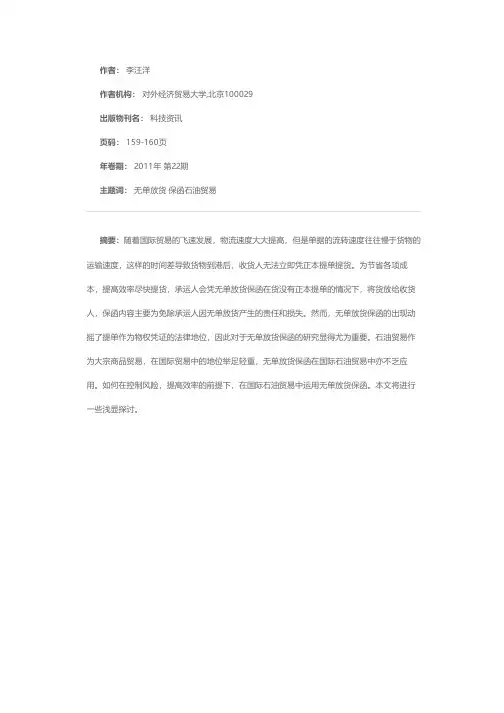
作者: 李汪洋
作者机构: 对外经济贸易大学,北京100029
出版物刊名: 科技资讯
页码: 159-160页
年卷期: 2011年 第22期
主题词: 无单放货 保函石油贸易
摘要:随着国际贸易的飞速发展,物流速度大大提高,但是单据的流转速度往往慢于货物的运输速度,这样的时间差导致货物到港后,收货人无法立即凭正本提单提货。
为节省各项成本,提高效率尽快提货,承运人会凭无单放货保函在货没有正本提单的情况下,将货放给收货人,保函内容主要为免除承运人因无单放货产生的责任和损失。
然而,无单放货保函的出现动摇了提单作为物权凭证的法律地位,因此对于无单放货保函的研究显得尤为重要。
石油贸易作为大宗商品贸易,在国际贸易中的地位举足轻重,无单放货保函在国际石油贸易中亦不乏应用。
如何在控制风险,提高效率的前提下,在国际石油贸易中运用无单放货保函。
本文将进行一些浅显探讨。
第1篇摘要:无单放货是指承运人在货物到达目的地后,未经收货人请求或同意,擅自将货物交给收货人或其指定的人的行为。
本文从无单放货的定义、法律适用、责任承担等方面进行探讨,以期为相关法律实践提供参考。
一、引言随着我国国际贸易的不断发展,货物运输业务日益繁荣。
然而,在货物运输过程中,无单放货现象时有发生,给当事人带来了诸多纠纷。
因此,深入研究无单放货的法律适用,对于保障当事人合法权益具有重要意义。
二、无单放货的定义无单放货,是指承运人在货物到达目的地后,未经收货人请求或同意,擅自将货物交给收货人或其指定的人的行为。
根据《中华人民共和国海商法》的规定,无单放货主要包括以下几种情形:1. 承运人未凭正本提单放货;2. 承运人未凭副本提单放货;3. 承运人凭提单副本放货;4. 承运人凭收货人出具的收货证明放货。
三、无单放货的法律适用1. 《中华人民共和国海商法》《中华人民共和国海商法》是我国调整海上运输关系的法律法规,其中关于无单放货的规定主要包括:(1)第三十一条:承运人应当根据收货人的要求,在货物到达目的地后,及时将货物交给收货人或者收货人指定的代理人。
(2)第四十一条:承运人未凭正本提单放货的,收货人可以要求承运人承担相应的法律责任。
2. 《中华人民共和国合同法》《中华人民共和国合同法》是我国调整合同关系的法律法规,其中关于无单放货的规定主要包括:(1)第一百零一条:当事人一方未履行合同义务或者履行合同义务不符合约定的,应当承担违约责任。
(2)第一百一十二条:当事人一方不履行合同义务或者履行合同义务不符合约定的,对方可以要求其承担违约责任。
3. 《中华人民共和国侵权责任法》《中华人民共和国侵权责任法》是我国调整侵权关系的法律法规,其中关于无单放货的规定主要包括:(1)第二十二条:因侵权行为给他人造成损害的,侵权人应当承担侵权责任。
(2)第二十三条:因侵权行为给他人造成损害的,侵权人应当承担赔偿责任。
四、无单放货的责任承担1. 承运人责任(1)赔偿损失:承运人未凭正本提单放货,给收货人造成损失的,应当赔偿收货人的损失。
第1篇一、引言无单放货,是指承运人在没有收到托运人提供的正本提单的情况下,擅自将货物交付给收货人或者其他有权提货的人的行为。
在货物运输过程中,无单放货是一种常见的违约行为,严重影响了国际贸易的顺利进行。
本文将分析无单放货的概念、成因、法律后果以及防范措施。
二、无单放货的概念及成因1. 无单放货的概念无单放货,又称“无单提货”或“无单放行”,是指承运人在没有收到托运人提供的正本提单的情况下,擅自将货物交付给收货人或者其他有权提货的人的行为。
根据《中华人民共和国海商法》的规定,提单是货物所有权的凭证,承运人应当根据提单的规定交付货物。
2. 无单放货的成因(1)托运人、收货人等原因导致的无单放货:由于托运人、收货人等原因,如伪造提单、提供虚假信息、延迟付款等,导致承运人无法收到正本提单,从而发生无单放货。
(2)承运人原因导致的无单放货:承运人因自身原因,如管理不善、内部人员违规操作等,导致无法按照规定程序收到正本提单,从而发生无单放货。
(3)第三方原因导致的无单放货:第三方如货运代理、仓库等,因违反规定,导致承运人无法收到正本提单,从而发生无单放货。
三、无单放货的法律后果1. 承运人的法律责任(1)违约责任:承运人违反了《中华人民共和国海商法》的规定,未按约定交付货物,应承担违约责任。
(2)侵权责任:承运人擅自将货物交付给收货人或者其他有权提货的人,侵犯了托运人的货物所有权,应承担侵权责任。
2. 托运人的法律责任(1)违约责任:托运人未按照约定提供正本提单,导致承运人无法正常交付货物,应承担违约责任。
(2)侵权责任:托运人如因自身原因导致无单放货,侵犯了承运人的合法权益,应承担侵权责任。
3. 收货人的法律责任(1)违约责任:收货人如因自身原因导致无单放货,如伪造提单、提供虚假信息等,应承担违约责任。
(2)侵权责任:收货人如擅自将货物交付给他人,侵犯了托运人、承运人的合法权益,应承担侵权责任。
四、防范无单放货的措施1. 完善法律法规:加强《中华人民共和国海商法》等法律法规的修订和完善,明确无单放货的法律责任。
大 众 文 艺21摘要:由于实务中各种原因,无正本提单放货是当前的一种普遍现象。
某种程度上,在以正本提单之外的单据加提货保函不具单提货己是航运实务中一种无可奈何的必需。
提货保函自出现和应用以来,成为海运理论和实务中广为关注的焦点。
保函的出现给国际贸易带来极大的便捷和经济价值,但同时保函对传统的国际贸易秩序产生强烈的冲击,并且保函的使用为提单欺诈提供了可乘之机。
实务界对保函褒贬不一,但由于各国成文法对运保函尚无明确规定,导致司法界、学术界对保函效力的问题一直存在争议。
有鉴于此,本文对此类保函的效力及使用该保函应注意的问题作一讨论。
关键字:无单放货;保函; 效力分析保函(Letter of Indemnity; Letter of Guarantee; Back Letter)又称“损害赔偿保证书”,其性质是一种保障赔偿的协议,是担保债务履行的一种方式。
它是由债务人或者保证人,债务人与保证人共同向债权人出具的,承诺由债务人履行到期债务,或者在债务人未能及时履行到期债务时,由保证人履行,并且赔偿债权人因未及时履行债务所造成的损失的书面担保。
一、保函的形式无单放货的保函通常有三种形式:1.第三人(保证人)出具的保函,大都由有资信的银行、保险公司、担保公司或者企业提供,债务人往往为此支付一笔费用。
这类保函可兑性较强,因此比较可靠;2.债务人与第三人共同出具的保函,具有保证合同性质,具有担保债务履行的功能;3.债务人自己出具的“保函”。
此类保函是债务人向债权人表示愿意承担责任和履行债务的一种承诺,是一种普通协议,起不到担保债务的履行的作用,因而它并非担保法意义上的保证合同,不具有担保性质。
二、保函的效力分析关于这种提货保函的效力,有多种看法。
一种观点是绝对地否定其效力,认为提货保函具有虚伪性和欺诈性的背景下产生的,其在实质上就是一种欺诈行为。
另一种观点恰好与上述观点相反,即认为提货保函在承运人和提货人之间始终视为有效。
无单放货/重签提单保函
致深圳市琪达国际货运代理有限公司:
船名:航次:
提单号:目的港:
箱号:
我司所配载之以上货物,因下列原因收货人在目的港无法凭正本提单提货:
[ ] 1. 正本提单尚在银行中流转。
[ ] 2. 正本提单被我司(或收货人,或在邮寄过程中)遗失。
[ ] 3. 正本提单尚在邮寄过程中,未到收货人手中。
现我司作为发货人特要求贵公司目的港代理以下列方式放货给下列收货人:
[ ] 1. 收货人出示按照保函格式填写的银行正本保函给贵司目的港代理,无须出示正本提单。
[ ] 2. 我司提供按保函格式填写的银行保函并登报声明遗失的提单作废,及发货人保函,请贵司重新签发全套正本提单,收货人凭新签发的正本提单提货。
[ ] 3. 收货人必须等候正本提单,贵司目的港代理必须凭原正本提单放货。
收货人如下:
公司名称 . 详细地址(包括电话号码及传真号码),联系人
.
. 我司担保因我司以上要求放货而产生的一切责任、风险和损失由我司无条件承担。
出保人签字盖章出保日期
注:1只有正本保函有效
2本保函内容必须用打字机打印,更改无效。
⽆单放货的保函-船东提供担保给提单持有⼈-租家是否仍有提供担保的义务FARENCO SHIPPING CO LTD v DAEBO SHIPPING CO LTD (THE “BREMEN MAX”) [2008] EWHC 2755 (Comm) Before Mr Justice TeareCharterparty (Time) - Letter of indemnity - Charter containing provision obliging owners to deliver cargo without production of bills of lading against LOI - Cargo discharged against LOI requiring charterer to put up security to prevent arrest or secure release of arrest - Holder of bill of lading subsequently arresting vessel - Owners putting up security to obtain release -Whether charterer remained under obligation to provide security - Whether undertakings in LOI conditional upon delivery to party named in LOI.英国商事法庭案例,期租租约规定船东允许⽆单放货,只要租家提供保函。
商事法庭判定即使船东已经提供担保给提单持有⼈,但这不免除租家仍要提供担保的义务。
另外,船东有义务按照保函要求⽆单放货给租家的指定收货⼈。
On 18 April 2007 the vessel Bremen Max was chartered by her owners (the owners) on an amended NYPE form to COSCO Bulk Carrier Co Ltd (Cosbulk). The vessel was sub-chartered under back-to-back charters to the claimant (Farenco), then to the defendant (Daebo), to Dampskibsselskabet Norden A/S (Norden) and to Deiulemar Shipping SpA (Deiulemar). Clause 68 of each charterparty imposed an obligation on the owners “to allow discharge and release the cargo on board” without production of bills of lading, against a letter of indemnity (LOI) issued by the charterer.In March 2008 a cargo of 70,888 mt Brazilian origin Sinter Feed Opportunity Tubarao was loaded at Tubarao, Brazil for carriage to and delivery at Bourgas, Bulgaria. The bills of lading named the consignee as “to the order of HSH Nordbank AG, London”. The notify address was “G and M-5, Bourgas, Bulgaria as agent and Kremikovtzi AD, Sofia, Botunetz”.On arrival of the vessel at Bourgas the owners were requested to deliver the cargo without production of the bills of lading. An LOI was provided by each charterer to its disponent owner. Each LOI was in the same form, and provided:. . . we. . . hereby request you to deliver the said cargo to KREMIKOVTZI AD, SOFIA - BOTUNETZ at PORT OF BOURGAS, BULGARIA without production of the original bill of lading.In consideration of your complying with our above request, we hereby agree as follows:1. To indemnify you. . . in respect of any liability, loss, damage or expense. . . which you may sustain by reason of delivering the cargo in accordance with our request.. . .3. If, in connection with the delivery of the cargo as aforesaid, the ship. . . should be arrested or. . . the arrest or detention thereof be threatened. . . to provide on demand such bail or other security as may be required to prevent such arrest or detention or to secure the release of such ship or property . . .4. If the place at which we have asked you to make delivery is a bulk liquid or gas terminal or facility, or another ship, lighter or barge, then delivery to such terminal, facility, ship, lighter or barge shall be deemed to be delivery to the party to whom we have requested you to make such delivery. . . .The cargo was discharged at Bourgas between 28 March and 2 April 2008. There was an issue as to whether the cargo was or was not delivered to Kremikovtzi.Subsequently, Stemcor UK Ltd (Stemcor) informed the owners that they were the holders of the bills of lading and that they were intending to commence proceedings against the vessel and the owners in order to obtain security for their claims for misdelivery in the sum of US$11 million. On 23 August 2008 Stemcor arrested the vessel in Australia. On the same day the owners put up security and the vessel was released.The owners obtained an attachment against Cosbulk’s assets and indicated that they were only prepared to release the attachment if Cosbulk provided security direct to Stemcor in the sum of US$11 million and also provided security for the owners’ claims in the sum of US$500,000. Those demands were passed down the line of charterers.In order to prevent Cosbulk attaching its assets, Farenco put up the requested security and called upon Daebo to provide substitute security to Stemcor. That request was passed down the line of charterers.On 24 October 2008 Farenco issued proceedings against Daebo and sought mandatory injunctive relief. Daebo informedNorden that it would seek the same relief against Norden. On 30 October 2008 Aikens J granted interim mandatory relief requiring Norden, failing whom Daebo, to provide the substitute security. He also ordered various preliminary issues to be determined, including:1. Whether clause 3 of the LOI obliged the party giving the indemnity to provide security directly to Stemcor.2. Whether the obligation in clause 3 of the LOI to provide such bail or other security was no longer a current obligation, the release of the vessel having already been secured.3. Whether the undertakings provided were conditional upon delivery to Kremikovtzi.The parties subsequently accepted that the answer to the first issue was that clause 3 of the LOI obliged the party giving the indemnity to provide security directly to Stemcor.As to the second issue, Deiulemar submitted that since the owners had provided security, it was not possible for any charterer to put up “such bail or other security as may be required to prevent such arrest. . .or to secure the release of such ship”, and that an order for specific performance should not be made because the court should not order a person to do the impossible.As to the third issue, Farenco contended that in the light of clause 68 of the relevant charter the LOI did not impose an obligation upon the disponent owners to deliver the cargo to Kremikovtzi. The reference to Kremikovtzi in the LOI was a representation by the charterers that Kremikovtzi was the person to whom they anticipated that the cargo would be delivered. Clause 68 provided the charterers with an option. Unless that option were exercised the disponent owners were obliged and entitled to deliver the cargo against presentation of the bills of lading.-Held by QBD (Comm Ct) (Teare J) that:(1) As to the second issue, the charterer remained under an obligation to put up security in accordance with clause 3 of the LOI notwithstanding that the owners provided security to obtain the release of the vessel. The commercial purpose of clause 3 was that the shipowner should not have to suffer the arrest of the vessel and that any bail or other security to prevent the arrest of the vessel should not be put up by the shipowner but by the charterer The action of the owners in putting up security had the effect of ending the detention of the vessel but the charterers remained in breach of their obligation. Specific performance was an appropriate remedy. Accordingly, the second issue would be determined in favour of Farenco-Laemthong International Lines Co Ltd v Artis (The Laemthong Glory (No 2)) [2005] 1 Lloyd’s Rep. 632 considered.(2) As to the third issue, the undertakings provided by the charterer in the LOI were conditional upon the owners delivering the cargo to Kremikovtzi. Clause 68 of the charterparty obliged the shipowner to allow the charterers to discharge the cargo, but discharge and delivery were different concepts. The obligation upon the shipowner in clause 68 “to. . . release the cargo on board” against the LOI obliged the shipowner to release, in the sense of deliver, the cargo to another against the LOI. The person to whom the cargo was to be released or delivered without production of the bills of lading was to be found in the LOI. The LOI contained a clear request to deliver the cargo to Kremikovtzi and a clear agreement by the shipowner to comply with that request in return for the undertakings given by the charterer If the shipowner delivered to anybody else without production of the bills of lading the charterer ’s undertakings were not engaged. Accordingly, the third issue would be determined in favour of Deiulemar。